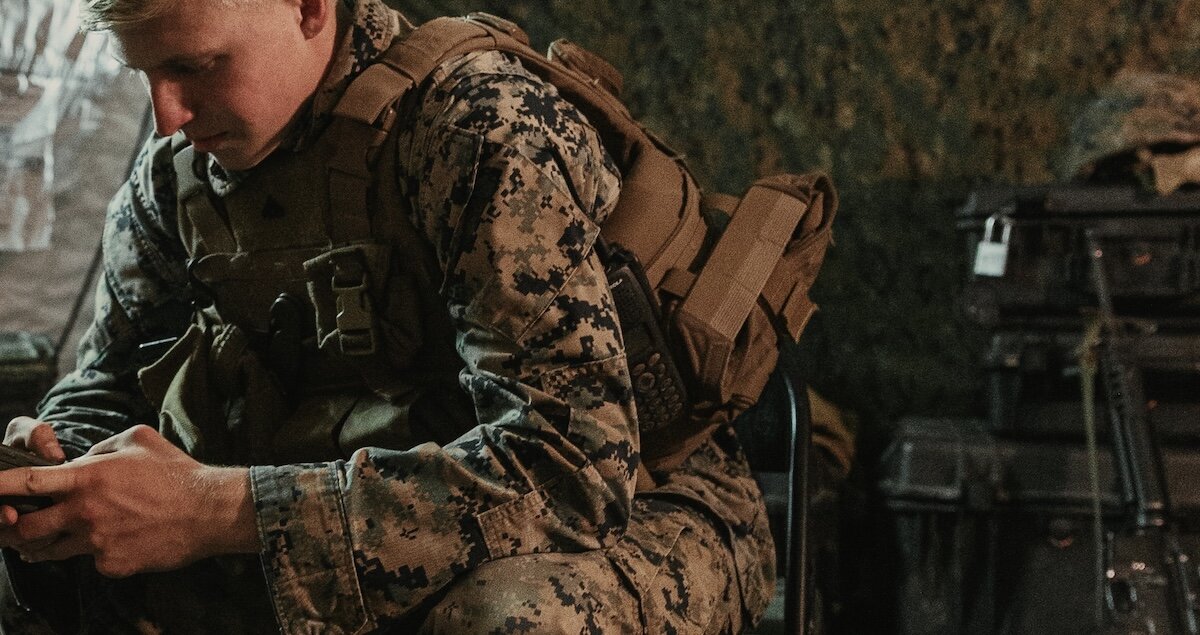In a recent article about sexual dysfunction in military veterans, we focused on the mental health barriers that lead to loss of libido and impotency. However, there is one sexual health issue for veterans and active members of the military that deserves its own analysis – porn addiction.
Research shows hat median consumption rates of porn are at 74.5% among men, and 58% among women, while 11% of men and 3% of women self-report as porn addicts. While there is no hard evidence to show that these rates are higher in military personnel, there are signs that point to a potential problem. For instance, like with casinos, sexually oriented businesses are built near military bases due to high demand. Fort Liberty (formerly known as Fort Bragg), the Army’s largest military base, has a number of strip clubs located right outside the base on Fort Bragg/Liberty Street. In a small town of just over 200,000 people, there are a eight active strip clubs, making it one of the highest per capita concentrations in the nation.
Of course, the proliferation of online pornography has made “sex content” more accessible than ever before on military bases – and in the palms of the hands of servicepersons. Operators know this, and are targeting military personnel with tailored campaigns to increase consumption rates. There is even a video greeting service that allows personalized greetings – filmed by porn stars – to be delivered to servicepersons deployed on bases overseas.
The innate allure of sexually explicit material, instant accessibility, and targeting of military personnel has created an issue:
“Military therapists and chaplains now hear with ‘alarming regularity’ from concerned military personnel that have become addicted to viewing pornography.”
Military Times
Should veterans and military personnel be more cautious when it comes to the consumption of porn, or are they no different than the general population? Perhaps the question should instead surround the potential for greater consequences on military bases and for the nation as a whole. Let’s review.
Why Veterans and Military Personnel Should Be Cautious in Regards to Their Relationship with Online Pornography
Porn Consumption Problematic with Common Military Mental Health Disorders
Research shows that problematic pornography use (PPU) cooccurs in individuals with compulsive sexual behavior (CSB), and that U.S. veterans in particular are at a greater risk of engaging in PPU. These studies also found that behavioral health disorders common to veterans including post-traumatic stress disorder (PTSD), depression, and anxiety were positively associated with higher PPUS scores.
Given the known vulnerability of veterans and active military to behavioral and mental disorders, the U.S. department of defense (DoD) would be wise to invest in further research and mental health support systems as they pertain to the treatment and therapy for porn addiction. This is important not just to protect our cherished veterans, but the nation which depends upon the health of our active military:
“The first recommendation asks the Department of Defense (DOD) to acknowledge existing evidence that indicates internet porn use may negatively impact military culture and, as a result, is detrimental to the overall readiness of the services. The DOD should then commission a team of industry professionals, social scientists, psychologists, and subject matter experts (military and civilian) to shine a light on the issue and conduct further research to understand the relationship between internet pornography use and the military. This commission should work directly with existing behavioral health offices in the military to encourage integrated research efforts and data sharing. The final recommendation is to develop a preliminary education series, targeting leaders, that outlines potential influences of internet pornography on command cultures.”
U.S. Marine Corps CSC
Chasing the Feel Good Chemical
Studies show that military personnel may become addicted to combat, which is partly due to the feelings associated with high levels of dopamine. Dopamine is the “feel good” chemical in the brain that is released during military exercises. Chasing this chemical reaction becomes complicated for veterans and active members as they seek to sustain the high, or suffer the mental health consequences.
In order to sustain the dopamine release when away from combat, servicepersons often look towards other activities that provide for a similar chemical reaction in the brain. There are a number of online activities that produce a similar reaction such as gambling, and for the intent and purpose of this article – consuming porn. Moreover, masturbation (which generally accompanies viewing porn) also causes the body to release dopamine, which adds another layer to the chase. More concerning, is that over time, the brain and body become accustomed to this psychological and physiological response of watching porn. As a consequence, consumption must increase in order to sustain the same response. From here, habitual behavior to the point of self-reported porn addiction.
Impact on Cognitive Performance
There are mental health issues associated with porn addiction that can impact cognitive performance. Studies find that anxiety, stress, and depression are strongly related to pornography consumption. All three (stress, anxiety, and depression) are known to impact both cognitive and physical performance in individuals. Is this something that America is comfortable with, within the Armed Forces?
Porn Culture Impact on Military Base Culture?
In the above section about how excessive porn consumption may be problematic with common military mental health disorders, we referenced how the DOD must acknowledge that problematic porn use (PPU) may negatively impact military culture. This is because there is already a systemic culture of sexual harassment and abuse on U.S. military bases. The Marine Corps has the highest percentage (13.4%) of servicewomen experiencing unwanted sexual contact, and the Navy rate has the second highest rate. While there is no evidence to suggest that excessive porn viewing (to the point of addiction) leads to these behaviors, allowing it to run unchecked certainly doesn’t foster an environment of respect between male and female servicepersons. While studies disagree on what percentage of porn depicts violence against women, any percentage is too high, especially in a community where assault and harassment is prevalent. More research needs to be done, but who can argue against the call to provide members of the military greater access to counseling for porn addiction?
What You Can Do Today
If you’re a veteran or active member of the military with a problematic relationship with porn, we encourage you to seek out help as soon as possible. You can learn more about our private and discrete porn addiction therapy services here. Furthermore, Kindbridge Behavioral Health has proven its dedication to supporting veterans through trying times. Together with the Kindbridge Research Institute (KRI) we have initiated a Military Veterans Project in the state of Colorado. The project includes dedicated programs that provide active military personnel and veterans with access to important mental health care services and support groups. We also offer affordable online counseling and therapy services to veterans across all 50 U.S. states. Lastly (and depending on when you find this article) we are proud to offer an educational seminar on strategies for overcoming pornography addiction. Click the button below to register.
Concerned About Your Relationship with Porn?
CALL +1 (877) 426-4258
OR


